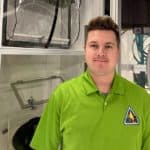-
Asked by Ephie to Tina-Jaine H, Sharron K, John T, Sujit B on 14 Mar 2024. This question was also asked by best1bus.0
Question: What degrees have you done (undergraduate, masters,etc) and would you say they were necessary to work in your desired field?
- Keywords:
-
John Turner answered on 14 Mar 2024:
I did an undergraduate BSc in Chemistry. My level of qualification is the minimum requirement to do my job as a scientist rather than a masters/PhD. I don’t feel like the ‘lack’ of further education compared to others has hindered me in finding a job or in doing my job now. In the end, it will be up to you to figure out what works best for you. If you really enjoy university/education continue down that route and do further education which will help you get a job later on. I struggled with revising for exams so for me the work environment suits me much better and I haven’t looked back!
-
Tina-Jaine Haigh answered on 15 Mar 2024:
I have done a Bachelor of Science Degree in physics (that’s an undergrad degree), and a Post Graduate Diploma in nuclear systems design (that’s at the same level as a Masters, but shorter).
In my field (nuclear safety engineering), we regard a degree in engineering or physics as the minimum necessary qualification. Engineering subjects can include mechanical, electrical, electronic, civil, structural or chemical engineering. The job requires understanding a wide range of engineering and science concepts, and a degree is the best way to prove you can do that. In my job I make use of aspects of chemistry, biology, physics, psychology, environmental science, plus many types of engineering. We don’t expect people who have just graduated to understand it all, because you can’t do degrees in all these subjects, but we need to know they are capable of learning what’s needed.
We do consider people with degree level apprenticeships too. These sometimes have a mix with more hands-on engineering and less written or analysis work, whereas nuclear safety engineering is analysis based and not hands-on. So if we had an applicant who had gone through the apprenticeship route, we would look at their experience to find out more about their ability to do the kind of analysis we cover. -
Sharron Kenny answered on 21 Mar 2024:
i did an undergraduate BSc(Hons) Biology and followed it up with a masters in Forensic science. i am now adding to this with a CChem from the royal society of chemistry as after 13 years working as a chemist i realised i dont actually have a chemistry qualification as such.
my colleauges all have different qualifications so many roads can lead to the same place some did aprentice schemes. others have PHD’s or studied nothing but pure chemistry.
if you follow what you enjoy and are the best at it will lead you where you need to be as science needs all sorts of people who are passionate about it but they dont all need to be the same
Related Questions
I havent done the best in my first year of maths, physics and chemistry, I was wondering if its possible for me to get
How important is it, in your opinion, to get your GSCEs?
How long have you worked on ai for. Is it hard to work on it and what grades in GCSE do you need to be able to work and
what work would you suggest we do that would look best on personal statements?
what qualifacations do you need for your job
what grade did you get in a level science
do you have to go to universety to be a scientest
Why did you choose to study science and where did you go to study it?
what subjects did you do for gcses
Latest Questions
-
How do you make new drugs
-
how many plants do you study normally?
-
what happens when a person whos sick gets a DNA while the person is sick what do you do
-
What are polysaccharides?
-
how many nuclear explosions happen in the world
-
how does your job effect your daily life ? (2 Comments)
-
why does nuclear waste glow in the dark? (1 Comment)
-
how to you deal with problems you come across when doing your research? (2 Comments)
-
If you have been emotionally invested (focusing on anxiety if you suffer with it, dementia etc) do you find it
-
what motivates you to carry out your research? (1 Comment)
Latest Comments
-
how does your job effect your daily life ? (2 comments)
-
why does nuclear waste glow in the dark? (1 comment)
-
what motivates you to carry out your research? (1 comment)
-
how to you deal with problems you come across when doing your research? (2 comments)
-
How long have you been a scientist for (2 comments)







Comments
Andrew M commented on :
Like John I did an undergraduate BSc in Chemistry but followed it up with a PhD. The degree was necessary but the PhD isn’t for my current role, and, in some regards, the 4 years of industrial experience would have been more useful for my career. I’m still glad it did it for the experiences it brough and the people I met, as well as making it clear to me that I wasn’t cut out for, and really didn’t want to pursue, an academic career. Often in science a negative result is as valuable as a positive one!
Rosa commented on :
I did an Agriculture Engineering degree followed with a master in plant protection, production and breeding. Finally I finsihed my PhD. Now I’m a postdoctoral researcher working on plant health theme.